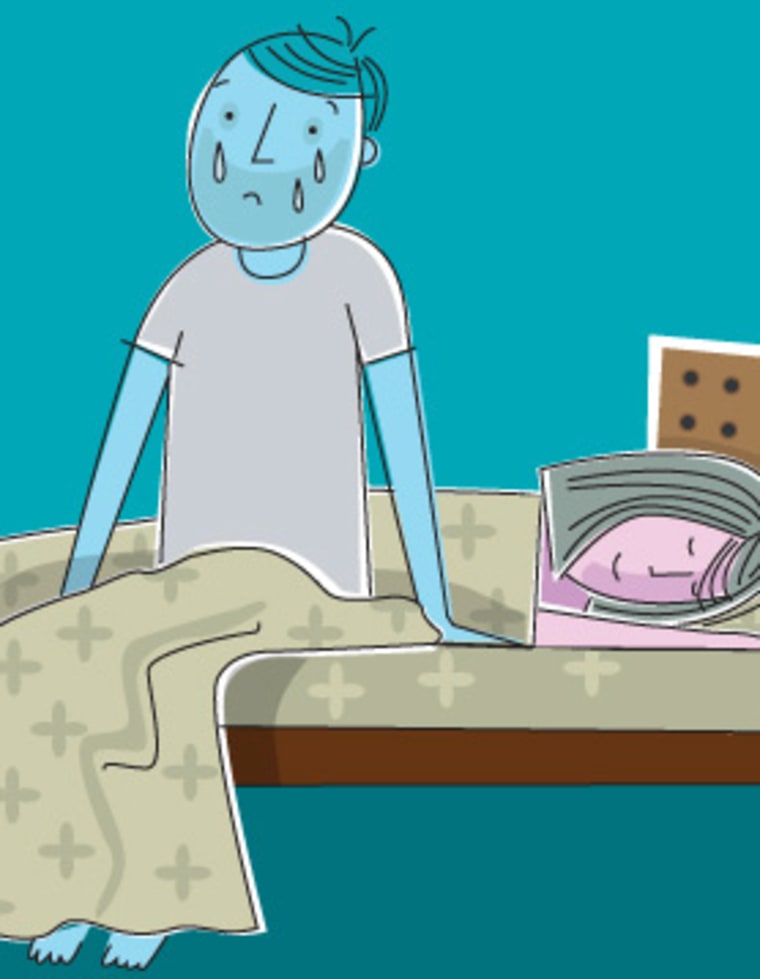Why would a guy get depressed following great sex and only feel better after a fast getaway? And is it so wrong if a woman wants to shelve sex — forever? Sexploration answers your most intimate queries. Got a question? .
Q: I’m male, 33, and wonder why the majority of times after sex with a chick I feel depressed. It could be the greatest sex ever, but afterwards I'm depressed and can’t wait to get away from her. As soon as I’m back in my car and on the road I feel better. Any insights?
A: Perhaps it would help you — and the women with whom you’re coupling — to know that what you seem to be experiencing has a name (other than “You bastard!” that is). It is “post-coital tristesse,” a Latin-French phrase that makes the whole thing sound sophisticated and much more romantic than “sadness after sex.”
Sit on our knee, and we’ll explain.
Many men, and some women, have been plagued by post-coital tristesse for ages. According to Aristotle, “the exhaustion consequent on the loss of even a very little of the semen is conspicuous because the body is deprived of the ultimate gain drawn from the nutriment … [so] as a general rule the result of intercourse is exhaustion and weakness rather than relief.”
The Roman poet Petronius, in the first century A.D., wrote “Doing, a filthy pleasure is, and short;/And done, we straight away repent us of the sport.”
Hence the Latin proverb, “Omne animal post coitum triste.” All animals are sad after sex.
My favorite treatment of the idea comes from the Irish poet W.B. Yeats in “The Chambermaid’s Second Song": “From pleasure of the bed,/Dull as a worm,/His rod and its butting head/Limp as a worm,/His spirit that has fled/Blind as a worm.”
Your spirit, the drive that took you to bed in the first place, has fled with your orgasm and so you get depressed and flee, too.
There may actually be a scientific reason why this happens, though I like the poetry better. It involves the hormone prolactin. That’s the same hormone women need to make milk, but men have it, too, and it shoots sky-high immediately after orgasm. When you have intercourse, it soars even higher, up to 400 percent higher, than it does after masturbation. We know this because sex researchers have paid college men to sit in rooms, watch porn and masturbate (beats working at Chuck E. Cheese's.) They interpreted this to mean that intercourse is a much more satisfying experience than masturbation.
All well and good, but in another study they concluded that prolactin works like a thermostat to shut off our desire, our appetites, and therefore the exciting, revved-up drives that make us try to satisfy them. So you get dull as a worm and your spirit flees. The more satisfying the sex with a woman, the duller you get.
You might also be having a little panic attack. In the heat of lust, men can find themselves saying “Babe, I am totally going to fly you to Barbados!” only to repent (“Wait! That $680 round-trip will kill my Bose home theater system!”) once it’s over.
We communicate other things with sex, too, like satisfaction, bonding and commitment. If we aren’t emotionally invested and ready to communicate those, however, repenting in the car might seem like a great idea.
By the way, if you try explaining any of this to a lover who asks what’s the rush, you might want to avoid calling her a “chick.” Just a thought.
Q: I’m a 45-year-old working mom, overweight but in good health, tired and just plain not interested in sex anymore. I don’t take any medications. My husband and I have been married for more than 27 years and while sex was never a top priority for us, it’s pretty much off the list for me now. Truthfully, I could not care less. I don’t know how much longer my husband will be patient. Is it possible to just not have sex anymore and be OK with it?
A: Sure it is. There’s no law that says you have to be a hootchie mama. If your husband doesn’t mind, no problem. But it sounds like you aren’t so sure about how he feels, so for crying out loud talk to him about it.
If one partner has a problem, both do. “If it doesn’t bother her, it’s her business to seek help or not,” says Sue W. Goldstein, author, with Lillian Arleque, of “When Sex Isn’t Good,” part compendium of women’s tales about their sexual issues and part resource guide. “But she may want to seek treatment for the sake of her relationship.”
So you may benefit from seeing a sex therapist or marrriage counselor.
But also bear in mind that low energy, weight gain and lack of desire may be related to perimenopause or medical conditions such as hypogonadism and thyroid issues. As such, you may want to consider talking with a physician who is knowledgeable about sexual medicine. If you discover that you have, say, a thyroid problem, and you try treating it, you — and your husband — may be surprised at how much you can enjoy what you’ve been missing.
MSNBC.com columnist and Glamour magazine contributing editor Brian Alexander’s new book is
